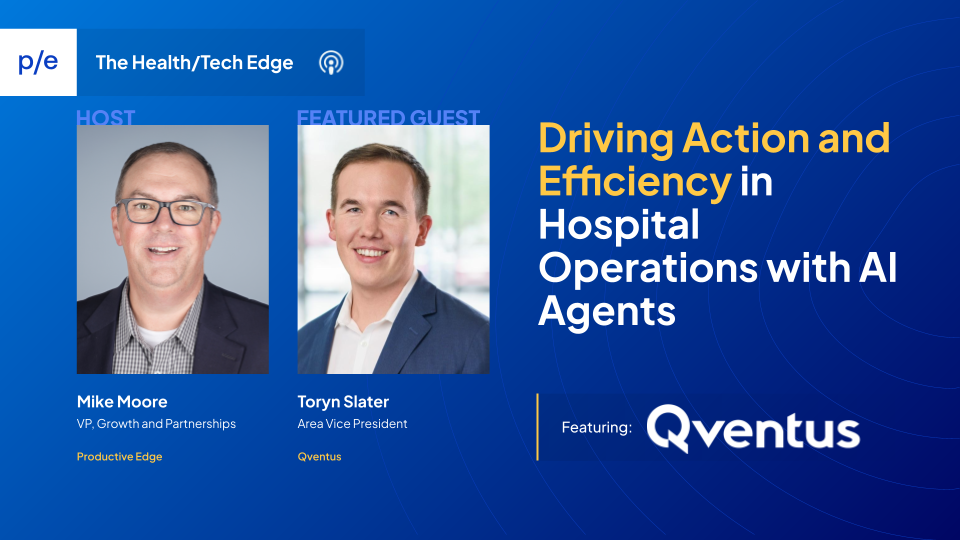In this episode of Health Tech Edge, we focus on where AI is already being utilized within hospitals. Not as a concept, but in real day-to-day operations.
Featuring Toryn Slater, Area VP at Qventus, on Health Tech Edge
Toryn Slater from Qventus joins me to talk about something they call AI operational assistance. It's a way to take the burden off care teams by automating tasks that slow them down and keep them from focusing on patient care.
From Insight to Action
Qventus started out building predictive analytics. They could forecast ED boarding times and patient discharges with impressive accuracy. But they realized something early on. That kind of insight doesn’t help much if it’s just sitting in a dashboard.
Toryn explains it clearly. Executives liked the insights. The people on the front lines didn’t, because it didn’t change their day. It just gave them one more screen to check.
So Qventus changed course. Now their AI tools are built to take action directly within EHR systems like Epic and Cerner. No extra logins. No added steps. Just quiet, background help that moves things forward.
What Is an AI Operational Assistant?
Think of it as a teammate that handles the administrative work. Tasks like retrieving records, sending faxes, managing follow-ups, and nudging schedulers when blocks of OR time are going unused.
These tools aren’t making clinical decisions. They’re helping nurses and care managers stay focused on patient care. They take care of what’s often called “below-license work,” the kind of things that need to get done but don’t require a nurse or doctor to do them.
Results That Matter
Qventus isn’t just talking about possibilities. They’re showing results:
-
2 more surgeries scheduled per OR each month
-
Up to 50 percent improvement in staff productivity during pre-op
-
15 to 30 percent fewer excess inpatient days
-
Around 30 effective beds added in a 500- to 600-bed hospital
All of this is happening in real hospitals with real patients.
Across the Care Journey
The tools Qventus has built follow the patient journey:
-
Surgical growth: Identifying and opening up unused OR blocks and matching them with patients who need urgent care.
-
Pre-admission testing: Automating the manual work nurses do to prepare patients for surgery, helping prioritize high-risk cases and reducing cancellations.
-
Inpatient capacity: Making sure beds are available when they’re needed most by helping move patients through the system more efficiently.
It’s about reducing delays, not adding more steps.
Don’t Start with the Technology
One of the main points Toryn makes is that most hospitals are still early in their AI journey. And that’s fine.
You don’t need a fully baked strategy. You just need a clear problem to solve. Qventus works with hospitals to identify pain points, then shows how their tools can help. No hype. Just results.
They also recently surveyed health system leaders. Two-thirds said their AI strategy was either limited or fragmented. If you feel behind, you’re not. You’re in the majority.
Final Thought
AI in healthcare doesn’t have to be abstract. It can be practical, focused, and immediate. The best tools don’t just tell you what’s wrong. They help fix it.
If your hospital is ready to stop talking about AI and start using it to get real work done, this episode is a good place to start.
🎧 Listen to the full episode above or on your favorite podcast app.
To learn more about Qventus, visit qventus.com




